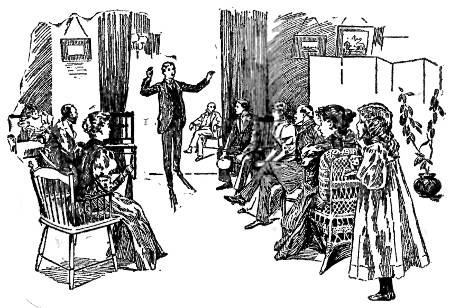RECITATIONS
For the Social Circle.
SELECTED AND ORIGINAL.

BY
JAMES CLARENCE HARVEY.
PUBLISHED BY
THE CHRISTIAN HERALD.
Louis Klopsch, Proprietor,
BIBLE HOUSE, NEW YORK.
Copyright, 1896.
By Louis Klopsch.
INTRODUCTORY NOTE.
In reading and recitation, the general tendency is to overdo. The quietreserve force, which can be made apparent in the voice, will reach theheart and stir the soul when gesture and ranting fail. "Be bold! Be not toobold" should be the watchwords of the reciter. Self-possession, with anervousness arising from an earnest desire to please, is the keynote tosuccess. Never gesticulate if you can help it. When a gesture assertsitself to such an extent that you have made it before you realize it, besure it was effective and graceful.
It is a noble ambition to wish to sway the hearts and minds of others bythe subtle modulations of the voice, and only he who feels the force ofwhat he utters can hope to accomplish his end. The thought of the authormust be pursued and overtaken. The sentiments between the lines must beenlisted before the voice will lend itself, in all its glorious power, tothe tones that thrill and the music that charms.
It is not always necessary to search for something your audience has neverheard. It is far better to reveal hidden thought and new life in selectionswhich are familiar.[Pg 4] The hackneyed recitation, if rendered better than everbefore, will win more applause than a fresh bit carelessly studied.
Above all, use judgment in selection. The stout lady of fifty-two shouldavoid "Marco Bozarris" and "The Elf Child," and the young lady just homefrom boarding-school should not attempt the ponderous utterances of a Romangladiator.
Care in selection; fidelity in study; wisdom in the choice of occasion;modesty in delivery; earnestness of manner and sincerity of feelingthroughout, must win at last. If you make failures, trace them to a lack insome one or more of these requisites and, by experience, learn to avoid arecurrence. Orators, like poets, are "born not made," but even the bornspeaker will fail at times unless these laws are considered and observed.Always render an author's lines as he wrote them. The chances are ten toone that every word carries its burden of thought, even though you may nothave discerned it. Err on the conservative side if in doubt.Over-enthusiasm is less easily pardoned.
Never select dialect verses or stories unless you have the unusual giftnecessary to give them the piquancy and zest which attends a goodimitation. Ask a dozen friends for an honest opinion on the subject anddraw an average from their criticisms to guide you in your choice ofselections. Don't lose[Pg 5] your temper over a severe criticism. Searchcarefully through your list of abilities and see if there is not, perhaps,some foundation for kindly suggestion. It is often a great assistance, inmemorizing the work of another, to make a written copy, but attentionshould be given to the making of a perfect copy, properly punctuated.
Use the eye in memorizing.
Oftentimes a mental picture of a page will recall a line which for aninstant seems about to escape you. Use the ear as well and study the effectof various modulations of voice as you rehearse in private.
Above all, use